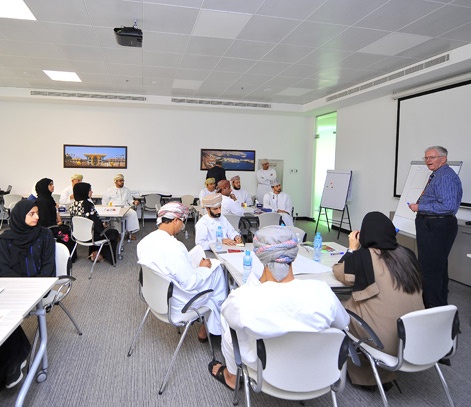

The SME Development Fund (SMEF) has been established in March 2014 & commenced operations in April 2014, an OAPFD initiative with the objective of developing entrepreneurship and financing small & medium enterprises in the Sultanate.
Over the past decade and a half, with the unveiling of the Vision 2020, the country has been diversifying its economy and investing in income and employment generating sectors congruent with its comparative advantages and social and cultural objectives.
This strategy has begun to bear fruit with the development of a modern infrastructure, rapid strides in education and health, the building of world class ports and airports, the development of competitive Free Trade Zones, creation of mega manufacturing projects and industrial clusters and the emergence of a vibrant tourism sector, which is likely to receive further impetus in the coming years.

With a growing population of youth entering the workspace, creation of employment is a key imperative. The SME sector has been found to create approximately 60% of all employment in both high and middle income countries. This is so because the sector, in the main, uses labour rather than capital as the dominant factor of production.
The SME sector, typically, provides employment avenues for workers with lower levels of education and skill than do large corporations with their dependence on sophisticated technology and automation. Similarly, large corporations are most often established and provide employment in concentrated pockets near large cities, ports, etc. SMEs on the other hand can and do develop around local markets and thus create geographically distributed employment in more rural areas, where the need for employment is greater. Thus SMEs make growth more inclusive socially and geographically.
Geographically distributed SMEs, in addition to providing local employment, also tend to get involved and invest in the communities in which they develop and operate. Thus the benefits of development are more equitably and widely distributed, in terms of community development.
Despite the presence of mega corporations and large multinationals, SMEs contribute more than 50% of the GDP in developed countries. In Oman the share of the SME sector is estimated to be 13 to 14%. However, there is considerable potential for further development. With the creation of excellent infrastructure, the growth of tourism and industrial clusters and given the emergence of a large pool of educated youth, the conditions are ripe for the Sultanate to develop the SME sector to give a further fillip to GDP growth and employment generation.
To achieve this objective, PFD (Partnership for Development; an offset initiative) partners, has recently promoted the 'SME Development Fund', on behalf of the Government of Oman, capitalized at $250 million and set up in the private sector. The SME Development Fund would help existing SMEs to grow in scale and scope and also seek to 'create' new entrepreneurs and SMEs. The capital for the Fund will be raised from pension funds and other investors in Oman and overseas (first tranche $36 mill) to support the activities of the fund and to strengthen its balance sheet, as described below.
Accordingly, the initiative has been structured as two entities: a Fund registered with the Capital Markets Authority (CMA) and a special purpose vehicle, registered as a company with the Ministry of Commerce and licensed by the (CMA). The latter, called the National Company for Projects and Management (NCPM), will receive, manage and disburse the sinking-fund grant. The Fund, utilizing its capital and commercial debt will operate the elements of 4 point plan, using third party service providers as depicted alongside. The fund will be managed by a Board, representing the interests of the investors, and NCPM will be governed by an Advisory Committee, constituted by Ministerial order, to approve and oversee the utilization of the sinking fund.

The Fund intends to 'orient' 500,000 students and aspiring entrepreneurs, over the next ten years. Of these, a significant majority will probably not progress to entrepreneurship; however, they would join the Omani workforce as better, more entrepreneurial employees.
The fund hopes to create 7,500 entrepreneurs (a mere 1.5%) and to see some of them grow to be 'large' firms. In so doing, it hopes to add over 50,000 new jobs, to bridge 10% of the 'missing middle' and to help create a 'cluster' of external capability in the form of 'entrepreneurial' educational institutions, training, accounting support, incubation, angel investing and a climate of SME development, which will in themselves become larger than the fund, for the achievement of the nation's objectives.
Copyright © 2017 SMEF . All rights reserved. Powered by ADventz